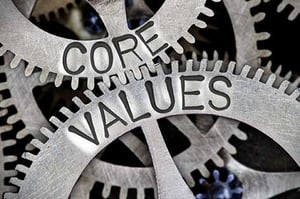
Reflections on Leadership: Integrity in Leadership
Integrity is the cornerstone of all human relationships. Integrity is also the central ingredient in trust, honesty, credibility, self-control, courage, and a host of other virtues that we ascribe to great leaders. The absence of integrity is a fatal leadership weakness. But if integrity is such an essential element in human relationships and the behavior and attitudes of leaders, why does it seem to be lacking in so many situations in modern life?
Over 10 years ago Marianne Jennings wrote the book The Seven Signs of Ethical Collapse. As an attorney and a professor of business ethics, she describes the fall of Enron, Tyco, Health South, WorldCom, Adelphia, Sunbeam and many others, and the horrific behavior of their leadership that resulted in criminal prosecution and the loss of millions (sometimes billions) of dollars. She uses the terms pressure, fear, hubris, weakness, a false sense of goodness and unusual innovation as the tools unethical leaders use to wreak misery and destruction on those unsuspecting souls around them.
 In the years since the book was published, the litany of ethical lapses has continued. The sorry state of ethical behavior is not limited to the executive suites of the largest business enterprises. It is found everywhere – including education, engineering, pharmacy, medicine, and sports.
In the years since the book was published, the litany of ethical lapses has continued. The sorry state of ethical behavior is not limited to the executive suites of the largest business enterprises. It is found everywhere – including education, engineering, pharmacy, medicine, and sports.
- In 2011 an investigation by the Georgia Bureau of Investigation found that 44 out of 56 schools cheated on the 2009 Criterion- Referenced Competency Tests. 178 teachers and principals were found to have corrected answers entered by students.
- In 2015 it was discovered that Volkswagen manipulated its programming to deliver false emissions data on its diesel engines to satisfy federal standards. The deception involved intentional behavior on the part of many highly trained engineers and decision makers.
- In 2017 John Kapoor, a billionaire pharmacist whose company developed a liquid version of the opioid painkiller fentanyl, was arrested in Phoenix on charges that he spearheaded a scheme to bribe doctors and pharmacists across the nation to boost sales — largely to patients who did not need the medication.
- In recent days Michigan State’s former director of sports and former Olympic gymnastics team doctor, Larry Nasser has been convicted of sexual assault of scores of women, including several Team USA gymnasts. As the investigation continues, institutional behavior at Michigan State University – including a pattern of ignoring complaints of the victims is at the heart of the scandal.
The lack of integrity can be found almost everywhere, and most of the time it never reaches the front page of the newspaper. But the problem of integrity has an even darker side than we would like to admit. The human condition predisposes us to recognize and call out the faults of others, while completely missing our own ethical lapses. Jesus’ words are convicting to everyone who is concerned about integrity. “Why do you see the speck that is in your brother’s eye, but do not notice the log that is in your own eye? How can you say to your brother, ‘Brother, let me take out the speck that is in your eye,’ when you yourself do not see the log that is in your own eye? You hypocrite, first take the log out of your own eye, and then you will see clearly to take out the speck that is in your brother’s eye.” (Luke 6:41-42, ESV). The first lesson of integrity is that it is best applied through a process of self-examination.
What is Integrity and how can we recognize it when we see it? Webster defines integrity in 3 ways:
- Firm adherence to a code of especially moral or artistic values (sometimes referred to as incorruptibility).
- An unimpaired condition (soundness- as in structural integrity).
- The quality or state of being complete or undivided (completeness).
Most of us think of the first definition when we think of integrity, but incorruptible, unimpaired, and undivided is a pretty good description of the characteristics that most people would like to see in a leader.
From my perspective, the question of how a person can examine their own ethical tendencies is not that difficult. A person can measure their own integrity by answering a few simple questions:
- What you do, or are willing to do, when you are convinced that no one else is looking?
- How do you behave when you believe you have an advantage over another person?
- Will you tell the truth, even when it does not place you in the most positive light?
- Will you do the honest thing, even when it cost you more than you could otherwise get away with?
When it comes to the practical application of integrity in the daily performance of our duties a number of other questions emerge:
- How do we handle a difficult customer? Do we respond to their request or just try to placate them with empty promises?
- Are our dealings with vendors above reproach? Do we play favorites instead of going for the best product at the best price?
- What do you do when you see a friend violate a rule? Do you simply look the other way?
- Do you publicly support a work rule or policy but privately fail to enforce it?
 Often as leaders, the foundations of integrity begin with who we hire and how we discipline people. Starting with a person whose values demonstrate integrity is a must. In my experience as a leader, I have regretted every occasion when I have hired someone when I had lingering questions about their integrity.
Often as leaders, the foundations of integrity begin with who we hire and how we discipline people. Starting with a person whose values demonstrate integrity is a must. In my experience as a leader, I have regretted every occasion when I have hired someone when I had lingering questions about their integrity.
Another frequent difficulty arises when someone of great talent and ability suffers a lapse of integrity that leads to their discharge from employment. In the termination process the question is often raised “Doesn’t my superior performance entitle me to a break?” Of course the answer is no. Admittedly it is easier to discharge a sluggard who lacks integrity, but talent cannot be a substitute for honesty.
Where does integrity come from – what is its source? Some people have suggested that there are universal principles of integrity that cross cultural boundaries. I am not knowledgeable enough to make that kind of sweeping generalization. I do know that integrity rarely survives without being anchored to something outside of human reasoning. This is because the human mind has an amazing ability to rationalize almost every kind of behavior. Even in the above examples there were attempts to shift blame for terrible behavior. Cheating on test scores was understandable given pressure caused by the unrelenting focus on test results. Bypassing emissions testing standards was due to the pressure to meet consumer performance expectations and increase sales. Sexual abuse? How could college officials be certain that the complaints of impressionable young women were valid? The reason given for some of the most horrible crimes in history has been “I was just following orders”.
If we cannot trust ourselves or the shifting standards of society, the anchor for integrity must lie elsewhere. In faith based organizations like Presbyterian Senior Living, integrity comes from our Judeo-Christian roots. Jennings calls these “Virtue Standards… the application of absolute values”. The teachings of the Old and New Testaments clearly state standards of right and wrong behavior, and expectations of justice, mercy, and kindness that have been regarded as virtue standards for thousands of years. How is this approach different from human reasoning? Jennings puts it this way, “Rather than seeking a justification for a desired outcome, the decision maker determines the outcome by honoring values first, not the outcome.”
Finally, any discussion on integrity is tempered by the realization that we all fall short of perfection. However, when it comes to integrity, we are faced with a fairly simple choice – What kind of person do I want to be? Will I be able to respect myself if I lack integrity in my relationships with others?
About Steve Proctor
As the now-retired CEO of Presbyterian Senior Living, Mr. Proctor was employed by PSL from 1971 - 2019. He is a Registered Nurse and Licensed Nursing Home Administrator with a BS degree in business administration from Elizabethtown College. He also holds a master’s degree in gerontology from the University of North Texas. Before becoming CEO, Mr. Proctor was Chief Operating Officer for 16 years. In addition, he has served as a Board member and is a Past President of the Pennsylvania Association of Non-Profit Homes for the Aging (“PANPHA”). In November of 1995, the American Association of Homes and Services for the Aging (“AAHSA”), now known as LeadingAge, recognized Mr. Proctor’s proven leadership and accomplishments by electing him to serve as Chair of its national board of directors. He served as Chair-elect in 1996 and 1997, as Chair in 1998 and 1999, and as past-Chair in 2000 and 2001. He has also served as chair of the International Association of Homes and Services for the Aging.

